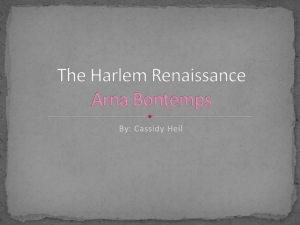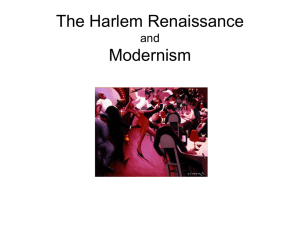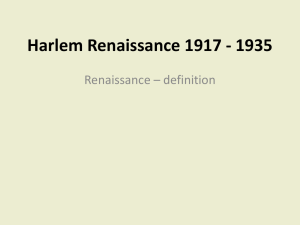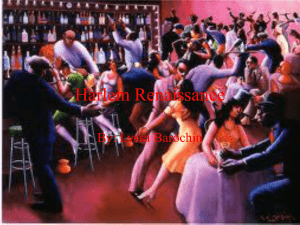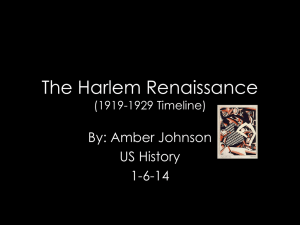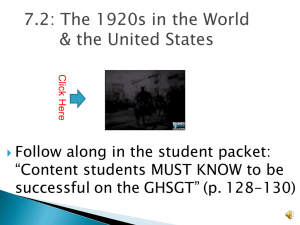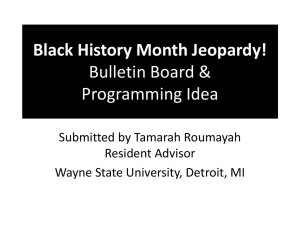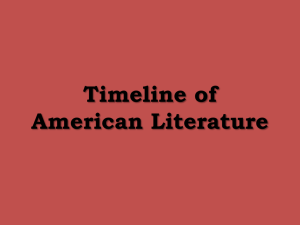Harlem Renaissance
advertisement
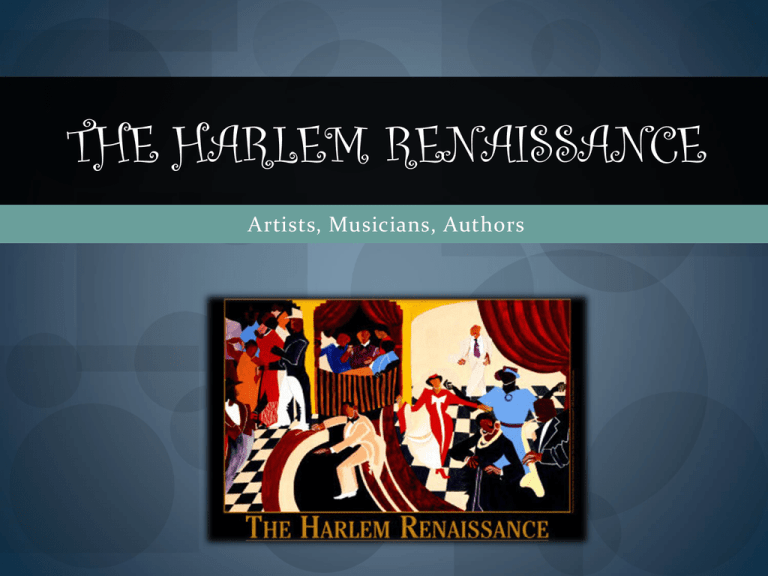
THE HARLEM RENAISSANCE Artists, Musicians, Authors Introduction-American Culture/Harlem Renaissance In 1904, Harlem, centered around 135th Street and 5th Avenue, became a Mecca for middle-class AfricanAmericans moving north from Hell’s Kitchen, Clinton, and other neighborhoods in New York City. Black intellectuals, writers, and other artists were among the first inhabitants of Harlem, the home of New Negro movement, as the literary and cultural aspects of the renaissance came to be called. Importantly prefigured by the writings of W.E.B. Du Bois and Booker T. Washington, the Harlem Renaissance and the New Negro movement generated an explosion of creativity unique in its breadth and depth; it included groundbreaking work in poetry, fiction, essays, music, dance, and theater. Lesson Title: The Impact of the Harlem Renaissance on the American Culture Lesson Focus: Literature, Art and Music Grade Level/Course: American History/ 11th grade Materials: Magazines, Computers, Pencils, Pens, Markers, Maps, Essential Questions How did art, music, and literature impact the cultural rebirth of the African American community during the 1920s? What impact did the Harlem Renaissance have on American society in the 1920s and today? Objectives The student will explain how the Harlem Renaissance was a “rebirth” for the African American culture through art, music, and literature and how it impacted this American society then and now. Day 1 Activities: A. The Gathering: The purpose of this activity is to help students understand the concept of “Renaissance and put it in the context of what they already know. Renaissance-Cultural Rebirth Characteristics of the Renaissance Period Geographical Economic Political Social Example: Activity B Harlem Renaissance Define Period • The students go to the Media center and use the computers to select an Illustration/Caption ECONOMIC Characteristics SOCIAL Characteristics Illustration/Caption POLTICAL Characteristics GEOGRAPHICAL Characteristics illustration that best Illustration/Caption describes the characteristics of each GEPS category. The students will need to include a caption to explain how the drawing explains this category. Illustration/Caption Day 2 LEAFLET Objective: The student will create a leaflet illustrating the feel of art, music and/or literature of the Harlem Renaissance. The Specifications for the Leaflet will explain the Title-convey a theme found in art, music or literature of the Harlem Renaissance. Illustration-describe the art, music or literature of HR and support title. A Quote and Author-from the art, music, or literature of the HR and support the title. Decorate-color and decorate your leaflet giving of the feel of the Harlem Renaissance during the 1920s. literature, art, or Name: music of the Harlem Period: Renaissance. Date: Day 3 Music Ex: Name of your song Objectives: The student will compare and contrast the music of the Harlem Renaissance to music that students listen to today. 1. Students will listen to “ The Joint Is Jumpin’ ” and “Mack the Knife” performed by Fats Waller and Louis Armstrong and compare it to a song that they listen to today by completing the Venn Diagram. Differences Differences Similarities Music Clips The Joint is Jumpin’ by Fats Waller http://www.youtube.com/watch?v=v7YAU8CTInw Mack the Knife by Louis Armstrong http://www.youtube.com/watch?v=hLIrS5dtTZI Day 4 DREAM VARIATION To fling my arms wide In some place of the sun, To whirl and to dance Till the white day is done. Then rest at cool evening Beneath a tall tree While night comes on gently, Dark like me-That is my dream! To fling my arms wide In the face of the sun, Dance! whirl! whirl! Till the quick day is done. Rest at pale evening . . . A tall, slim tree . . . Night coming tenderly Black like me. Literature Objective: The student will write opinions, ideas, and/or questions about how the poem “Dream Variation” by Langston Hughes which was written during the period of the Harlem Renaissance. 1. Read the poem “Dream Variation” by Langston Hughes which was written during the period of the Harlem Renaissance. 2. Then free –write your opinions, ideas, and/or any questions you might have about how it reflects the cultural “rebirth” of African Americans during the 1920s. Day 4 cont’d Objective: The student will use the information gathered on their ESPG graphic organizer to write their Bio-Poem about the Harlem Renaissance. Students need to remember that economic, social, political, and geographical characteristics need to be included in their Bio-Poem. Create an original TITLE Line 1: Harlem Line 2: A period of time that is Three descriptive word that describe the Harlem Renaissance. Line 3: That hears 1-3 ideas Line 4: That feels 1-3 ideas Line 5: That sees 1-3 ideas Line 6: That gives 1-3 ideas Line 7: That fears 1-3 ideas or people Line 8: That would like to see A person, place or event Line 9: That shares A person, thing or idea Line 10: Is important because Line 11: Is a resident of A place Line 12: Renaissance Day 5 Art Objective: The student will analyze how art of the Harlem Renaissance contributed to the “Cultural Rebirth” of African American in the 1920s. 1. Students will complete the graphic organizer explaining how this piece of art from the Harlem Renaissance contributed to the “Cultural Rebirth” of African Americans in the 1920s. Conclusion: List a detail from the painting and explain its relationship to the Harlem Renaissance. Title this Painting “Orchestra” from Negro Drawings by Miguel Covarrubias (1927) List a detail from the painting and explain its relationship to the Harlem Renaissance How does this piece of art reflect the African American cultural “rebirth” during the American Twenties? FAMOUS RENAISSANCE MEN & WOMEN C a b Langston Hughes C a l l o w a y Zora Neale Hurston B e s s i e S m i t h Duke Ellington James Weldon Johnson And now, for our feature presentation Here’s a little clip honoring Harlem Renaissance Art History. Starring: Palmer Hayden Aaron Douglas Jacob Lawrence http://www.youtube.com/watch?v=kGZh9VUllVs
